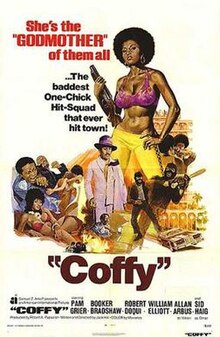
Jackie Brown is a 1997 American crime film written and directed by Quentin Tarantino, based on the 1992 novel Rum Punch by Elmore Leonard. It stars Pam Grier as Jackie Brown, a flight attendant who smuggles money between the United States and Mexico. Samuel L. Jackson, Robert Forster, Bridget Fonda, Michael Keaton, and Robert De Niro appear in supporting roles.

Pamela Suzette Grier is an American actress and singer. Described by many as cinema's first female action star, she achieved fame for her starring roles in a string of 1970s action, blaxploitation and women in prison films for American International Pictures and New World Pictures. Her accolades include nominations for an Emmy Award, a Golden Globe Award, a Screen Actors Guild Award, a Satellite Award and a Saturn Award.

Foxy Brown is a 1974 American blaxploitation film written and directed by Jack Hill. It stars Pam Grier as the title character who takes on a gang of drug dealers who killed her boyfriend. The film was released by American International Pictures as a double feature with Truck Turner. The film uses Afrocentric references in clothing and hair. Grier starred in six blaxploitation films for American International Pictures.

Robert DoQui was an American actor who starred in film and on television. He is best known for his roles as King George in the 1973 film Coffy, starring Pam Grier; as Wade in Robert Altman's 1975 film Nashville; and as Sgt. Warren Reed in the 1987 science fiction film RoboCop, the 1990 sequel RoboCop 2, and the 1993 sequel RoboCop 3. He starred on television and is also known for his voice as Pablo Robertson on the cartoon series Harlem Globetrotters from 1970 to 1973.

Sheba, Baby is a 1975 American blaxploitation action film directed by William Girdler and starring Pam Grier and Austin Stoker.
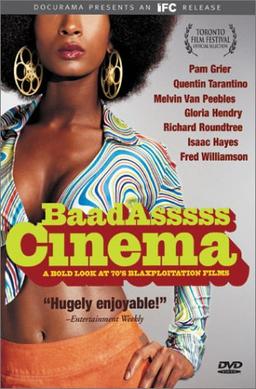
BaadAsssss Cinema is a 2002 TV documentary film directed by Isaac Julien. Julien looks at the Blaxploitation era of the 1970s in this hour-long documentary.
Ed Guerrero is an American film historian and associate professor of cinema studies and Africana studies in the Department of Social and Cultural Analysis at New York University Tisch School of the Arts. His writings explore black cinema, culture, and critical discourse. He has written extensively on black cinema, its movies, politics and culture for anthologies and journals such as Sight & Sound, FilmQuarterly, Cineaste, Journal of Popular Film & Television, and Discourse. Guerrero has served on editorial and professional boards including The Library of Congress' National Film Preservation Board.
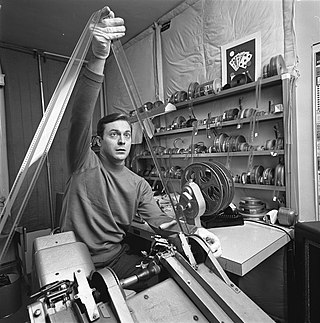
Jack Hill is an American film director in the exploitation film genre. Several of Hill's later films have been characterized as feminist works.

Get Christie Love! is an American crime drama TV series starring Teresa Graves as an undercover female detective which originally aired on ABC from January 22, 1974, until April 5, 1975. The starring television role made Graves the second African-American female lead in a U.S. network drama, after Diahann Carroll in Julia. The series is based on Dorothy Uhnak's crime-thriller novel The Ledger.
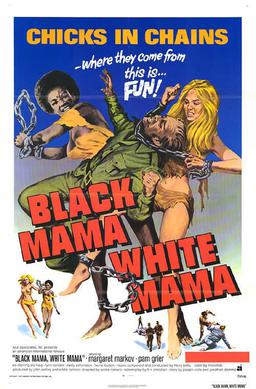
Black Mama White Mama, also known as Women in Chains, Hot, Hard and Mean and Chained Women, is a 1973 women in prison film directed by Eddie Romero and starring Pam Grier and Margaret Markov. The film has elements of blaxploitation.
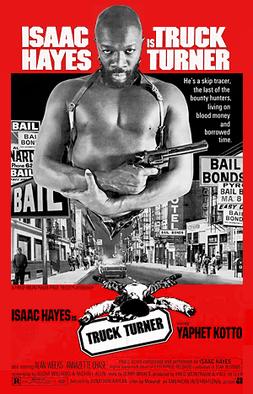
Truck Turner, also known as Black Bullet, is a 1974 blaxploitation film, starring Isaac Hayes and Yaphet Kotto, and directed by Jonathan Kaplan. The screenplay was written by Michael Allin, Leigh Chapman, and Oscar Williams. Hayes also scored the music for the soundtrack. The film was released by American International Pictures as a double feature with Foxy Brown.

Scream Blacula Scream is a 1973 American blaxploitation vampire horror film. It is a sequel to the 1972 film Blacula. The film was produced by American International Pictures (AIP) and Power Productions. This was the acting debut of Richard Lawson.

Women in Cages is a 1971 women in prison sexploitation film directed by Gerardo de León and starring Jennifer Gan, Judy Brown, Roberta Collins, and Pam Grier. Co-produced by Roger Corman, it was prominently featured in the Planet Terror portion of the 2007 film Grindhouse. Grindhouse director Quentin Tarantino said of the film, "I'm a huge, huge fan of Gerry de Leon.... the film is just harsh, harsh, harsh." He described the final shot as one of "devastating despair".
Carolyn Ann Stewart, known professionally as Carol Speed, was an American actress, singer-songwriter and author. Speed was best known for her roles in films during the 1970s blaxploitation era, most notably starring as Abby Williams in the American International Pictures 1974 blaxploitation horror film Abby (1974).
Roberta Collins was a film and television actress who was known for her attractive physique, blonde, curly hair, and Marilyn Monroe appearance. She starred in many exploitation films, including the prostitute Clara in Tobe Hooper's Eaten Alive and Matilda the Hun in the science-fiction film Death Race 2000.

Friday Foster is a 1975 American blaxploitation film directed by Arthur Marks and starring Pam Grier in the title role. Yaphet Kotto, Eartha Kitt, Scatman Crothers and Carl Weathers co-starred. It is an adaptation of the 1970–74 syndicated newspaper comic strip of the same name, scripted by Jim Lawrence and illustrated by Jorge Longarón. This was Grier's final film with American International Pictures. The tagline on the film's poster is "Wham! Bam! Here comes Pam!"

Blaxploitation is an ethnic subgenre of the exploitation film that emerged in the United States during the early 1970s, when the combined momentum of the civil rights movement, the Black power movement, and the Black Panthers spurred black artists to reclaim power over their image, and institutions like UCLA to provide financial assistance for students of color to study filmmaking. This combined with Hollywood adopting a less restrictive rating system in 1968. The term, a portmanteau of the words "black" and "exploitation", was coined in August 1972 by Junius Griffin, the president of the Beverly Hills–Hollywood NAACP branch. He claimed the genre was "proliferating offenses" to the black community in its perpetuation of stereotypes often involved in crime. After the race films of the 1940s and 1960s, the genre emerged as one of the first in which black characters and communities were protagonists, rather than sidekicks, supportive characters, or victims of brutality. The genre's inception coincides with the rethinking of race relations in the 1970s.

Slaughter is a 1972 blaxploitation film directed by Jack Starrett and starring Jim Brown as a former Green Beret captain seeking revenge for a murder. Stella Stevens, Rip Torn, Don Gordon and Cameron Mitchell co-star. This film was followed by a sequel the following year, Slaughter's Big Rip-Off (1973).

Hit Man is a 1972 American crime film directed by George Armitage and starring Bernie Casey, Pam Grier and Lisa Moore. It is a blaxploitation-themed adaptation of Ted Lewis' 1970 novel Jack's Return Home, more famously adapted as Get Carter (1971), with the action relocated from England to the United States.
Arthur Ronald Marks was an American film and television director, writer, producer and distributor best known for his work in the blaxploitation genre, directing films such as Bonnie's Kids, Detroit 9000, Friday Foster, Bucktown, The Monkey Hu$tle and J. D.'s Revenge. He also directed and produced numerous episodes of the American legal drama Perry Mason, as well as episodes of Starsky & Hutch, Mannix, I Spy, My Friend Tony, The Dukes of Hazzard, Steve Canyon, and Young Daniel Boone.
